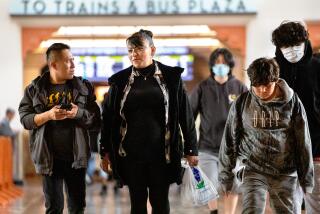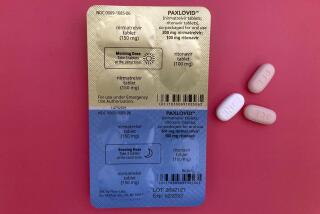Declaration to accelerate work on H1N1 vaccine
- Share via
One immediate effect of the declaration of an H1N1 flu pandemic will be to speed the production of a vaccine against the new virus, but it will be fall at the earliest before the first doses are available.
Scientists have encountered some problems in paving the way for such a vaccine. The H1N1 virus grows more slowly in eggs than the seasonal flu virus does, so it has taken longer than expected to prepare the seed stocks of virus that manufacturers will use to start production.
But all have now received the starting material, which will allow them to begin full-scale efforts at production, according to Dr. Marie-Paule Kieny of the World Health Organization.
Some companies that do not manufacture a seasonal flu vaccine have already started growing the virus, she said, and others will do so as soon as they finish their current vaccine runs, probably within the next week or two. But it is not yet clear whether the slow-growth problems encountered in producing the seed stock will carry over into production.
Preliminary tests also suggest that higher than normal amounts of killed virus will be required to produce the necessary immune response, which could also slow the manufacturing process.
“For the H1N1 vaccine, we need a lot of antigen to get the response,” said Dr. Anne Schuchat, director of the Centers for Disease Control and Prevention’s National Center for Immunization and Respiratory Diseases.
Most manufacturers are planning to use an adjuvant in their vaccines -- a chemical that stimulates the immune system to react more strongly to the viral antigens. But the combinations of adjuvant and virus must be tested in animals and humans.
Kathleen Sebelius, the new secretary of Health and Human Services, said May 22 that the department would devote nearly $1 billion toward vaccine development and manufacturing. The department has already placed orders with five manufacturers for $650 million worth of antigen and $287 million worth of adjuvant, Schuchat said.
The Department of Defense has also awarded development money and contracts for vaccine.
WHO Director-General Margaret Chan emphasized that, in the aftermath of the pandemic declaration, the agency would do everything possible to accelerate the testing required.
Nonetheless, it will be September at least before the first doses are available, and even then, “there will be limited supply of vaccine,” she said. “The challenge to the world will be to look at who should get the vaccine and, within a country, which groups get the vaccine.”
But Schuchat cautioned that use of the vaccine was not a foregone conclusion.
“The decision on whether or not to use a vaccine is a separate decision from whether or not to make it,” said Dr. Thomas R. Frieden, the new CDC director.
Even if CDC decides not to recommend use of the vaccine, Schuchat added, the orders already placed “permit the chemicals to be stored in bulk where they could later be formulated if they needed to be. We’ve done this in a way that gives us a lot of options for the future.”
--






